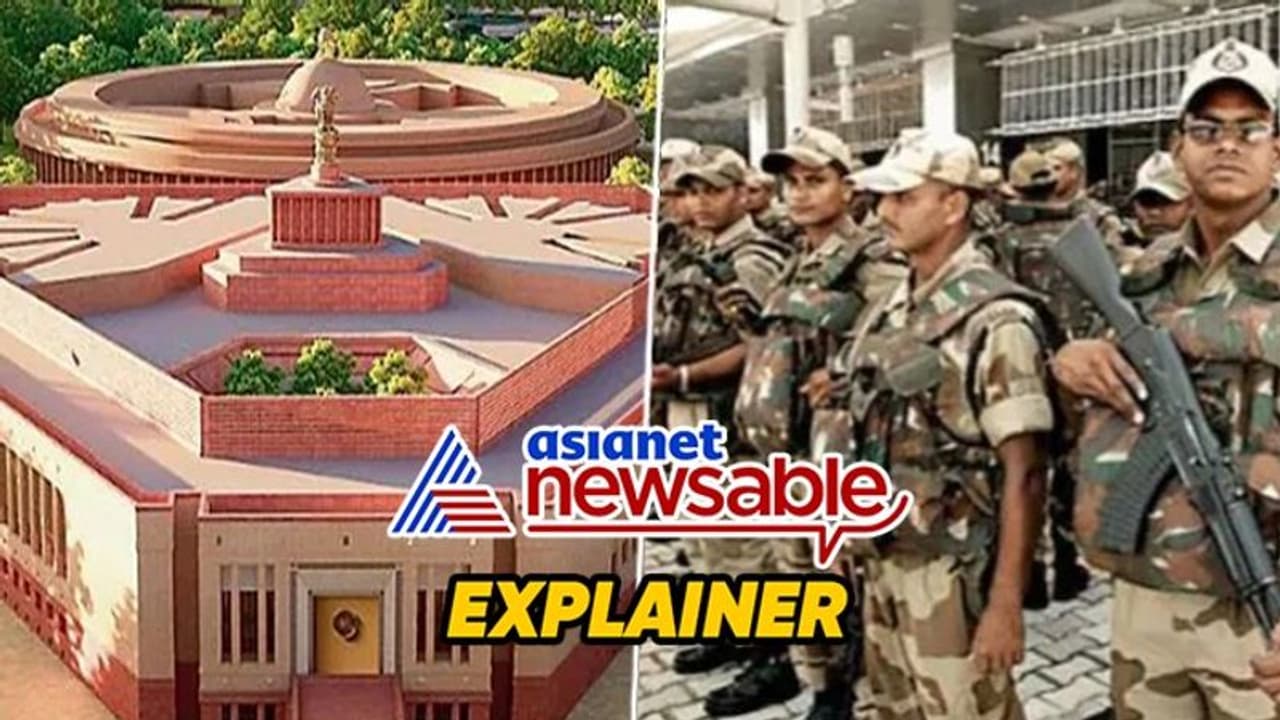Established in the aftermath of the 2001 terrorist attack on Parliament, CISF is an armed force with a specialized focus on securing central government buildings in the national capital. The force's extensive mandate includes maintaining high-security standards, conducting anti-sabotage checks, and ensuring swift contingency responses.
In response to a recent security breach at the Parliament building complex, the Indian government has taken a decisive step to enhance security measures by assigning the responsibility to the Central Industrial Security Force (CISF). This move aims to fortify the security infrastructure, aligning it with stringent protocols akin to airport security procedures. The Union Home Ministry has issued directives for a thorough survey of the Parliament building complex. The aim is to institute a "regular deployment of the CISF security and fire wing on a comprehensive pattern."

The urgency for these measures heightened following a recent security breach on the anniversary of the 2001 Parliament terror attack. During this incident, individuals infiltrated the Lok Sabha chamber, releasing yellow smoke and shouting slogans. MPs intervened to subdue them, while outside the Parliament premises, other protesters sprayed colored smoke during their demonstration. An inquiry committee, led by Central Reserve Police Force (CRPF) Director General Anish Dayal Singh, identified security lapses at the entrance, particularly during visitor frisking.
“Delhi Police personnel went on deputation to the Parliament Security Services. They are not working under the command of Delhi Police, but at the entrance gate, the personnel are working under the command of its security wing division,” a senior official said.
An internal communication to CISF (Headquarters), Under Secretary Ashutosh Kumar said on December 20, “In principle approval of the competent authority is conveyed for carrying out the survey of the Parliament Premises and its building for regular deployment of CISF – both Security Wing and Fire Wing – on comprehensive pattern under Government Building Security (GBS).”
In response to the MHA's guidance, a Deputy Inspector General (DIG)-rank CISF officer issued a letter on December 20 to the Inspector General (IG) of CISF's NCR Sector, requesting a survey for routine deployment.
“In pursuance of MHA’s ‘In-Principle’ approval, board for conducting joint survey of Parliament Premises and its Buildings for regular deployment of CISF Security and Fire Wing on comprehensive pattern, as per PSU and Fire norms, is hereby constituted with Ajay Kumar, DIG, CISF Unit CGBS, New Delhi as Presiding Officer,” the letter says.
“It is requested to detail other members of the joint survey board including an officer with technical expertise. An officer of CISF Fire Wing may also be detailed in consultation with the Fire Directorate The survey board may be directed to conduct the survey instructions/guidelines issued from time to time on conducting surveys in association with representative(s) of the Parliament Secretariat,” the letter adds.
“Duly completed survey reports for Security and Fire Wing with these documents may kindly be submitted to this Directorate at the earliest for further process please; information proforma, and IFD chart with specific justification for each duty post,” the letter further says.
Some of the key security measures and efforts to be undertaken are:
Body Frisking: CISF will reportedly conduct thorough body frisking using handheld detectors, ensuring a meticulous screening process for all individuals entering the Parliament complex.
X-ray Scans: Belongings of visitors will reportedly undergo X-ray scans to detect any concealed items that may pose a security risk.
Thorough Scanning: CISF will reportedly introduce the practice of scanning shoes, along with additional checks on heavy jackets and belts, adding an extra layer of security.
CISF Training Initiatives: Members of the Parliament watch and ward security are set to undergo specialized training at a CISF center, focusing on effective human and goods frisking techniques. This training is crucial to ensure a seamless transition and optimal implementation of enhanced security protocols.
Comprehensive Security Coverage: Both the old and new Parliament complexes, along with associated buildings, will now fall under the comprehensive security coverage of CISF. This integration includes elements from the Parliament Security Service (PSS), Delhi Police, and the Parliament Duty Group (PDG) of the CRPF, consolidating efforts for a robust security framework.
Ongoing Security Evaluation: A committee, led by CRPF Director General Anish Dayal Singh, is actively assessing overall security issues at the Parliament complex. The committee aims to make recommendations for improvements, ensuring that security measures remain adaptive and effective.
Number of CISF personnel: The examination, carried out by specialists from the CISF's government building security unit, will ascertain the required number of CISF personnel and delineate the roles of each security agency participating in Parliament security.
Established in the aftermath of the 2001 terrorist attack on Parliament, CISF is an armed force with a specialized focus on securing central government buildings in the national capital. The force's extensive mandate includes maintaining high-security standards, conducting anti-sabotage checks, and ensuring swift contingency responses.
As per the MHA, the CISF presently offers security protection to various critical installations such as atomic power plants, space installations, defence production units, mines, oil fields, refineries, major seaports, heavy engineering, steel plants, fertilizer units, airports, hydroelectric or thermal power plants, sensitive government buildings, heritage monuments, and significant private sector units. Additionally, it extends security cover to 355 units, encompassing 66 domestic and international airports, along with fire protection coverage for 110 industrial undertakings.
As CISF takes charge of Parliament security, this move reflects the government's commitment to bolstering national security and protecting critical institutions. While the recent security breach prompted this strategic shift, the ongoing collaboration between CISF and other security agencies is expected to fortify the Parliament's defences, ensuring a secure environment for lawmakers, staff, and visitors. As the CISF assumes its new responsibilities, its focus on professionalism, cutting-edge technology, and a people-friendly approach will likely shape the future landscape of Parliament security.
